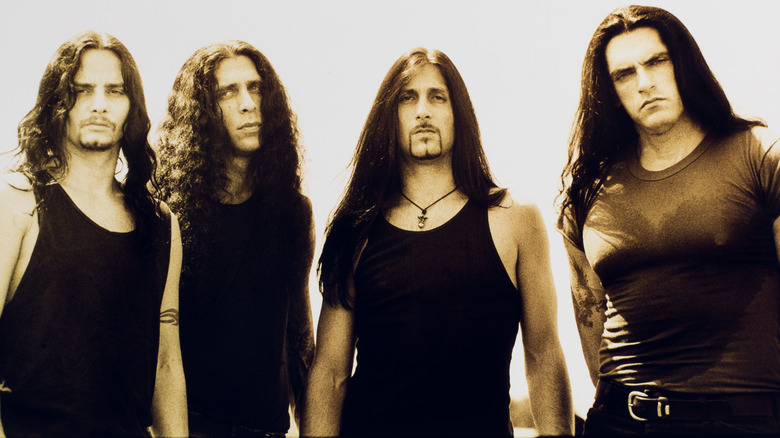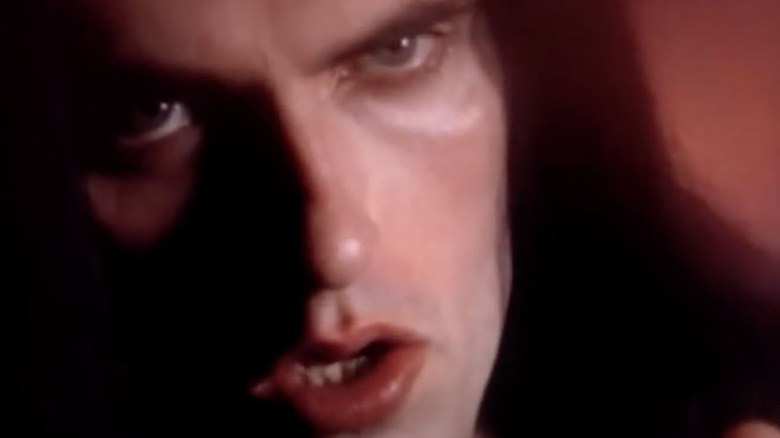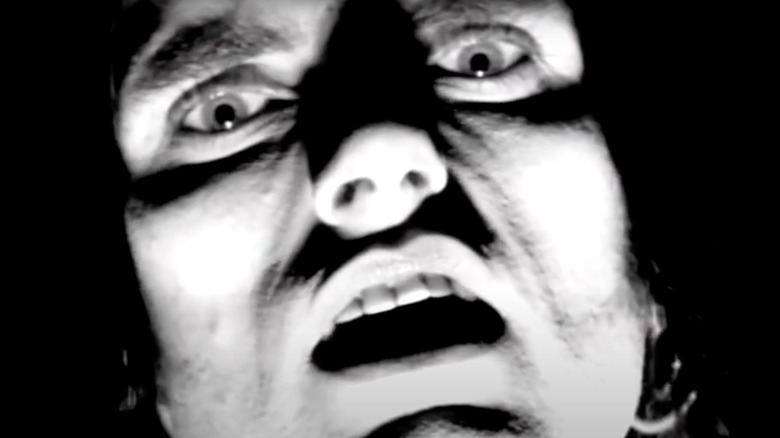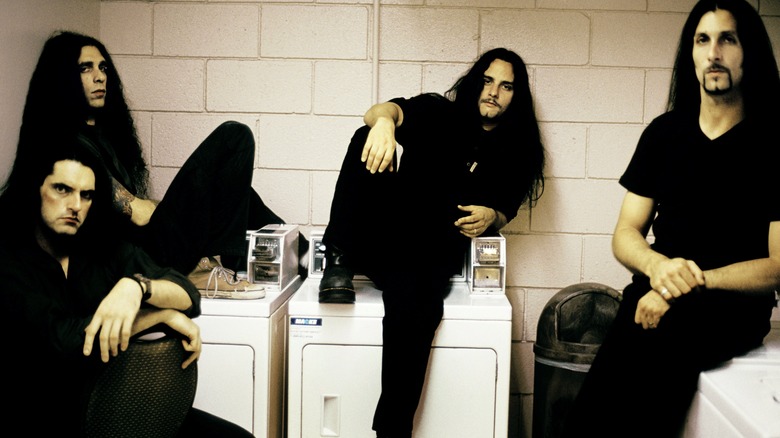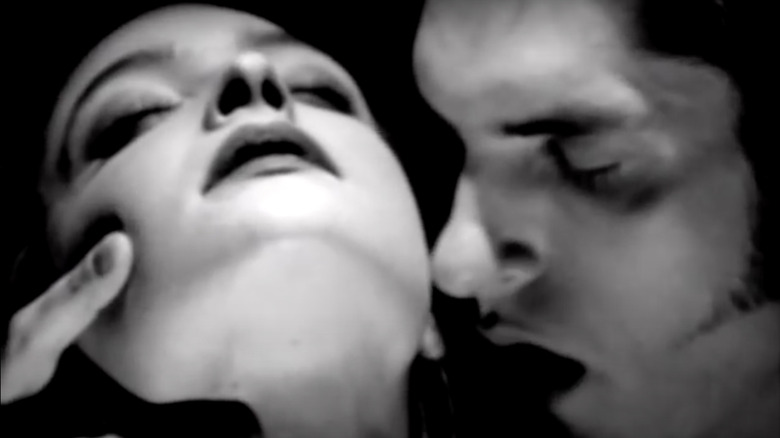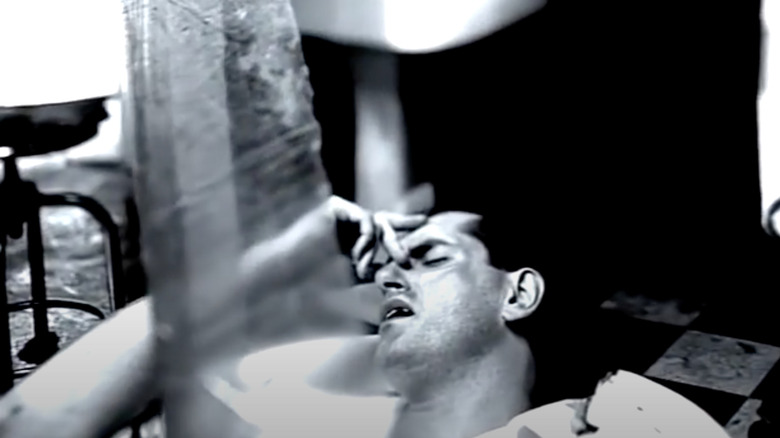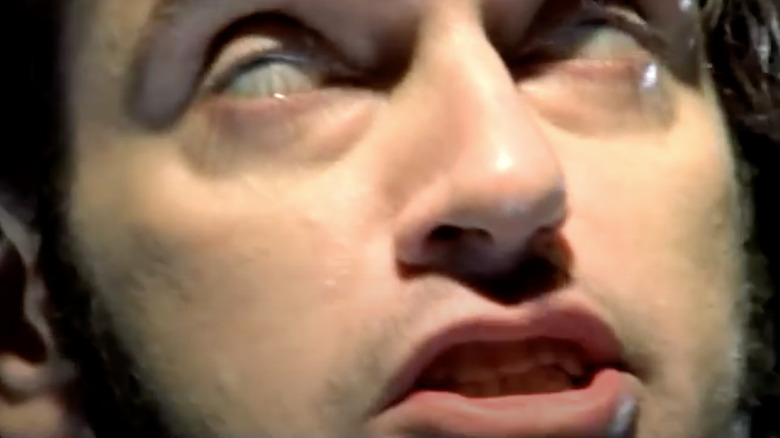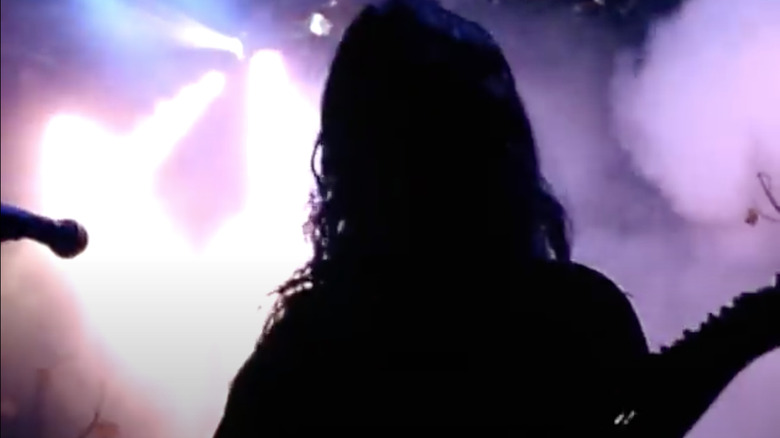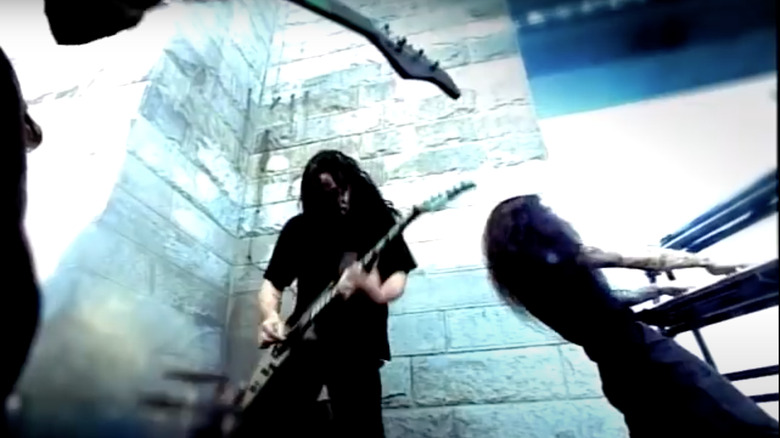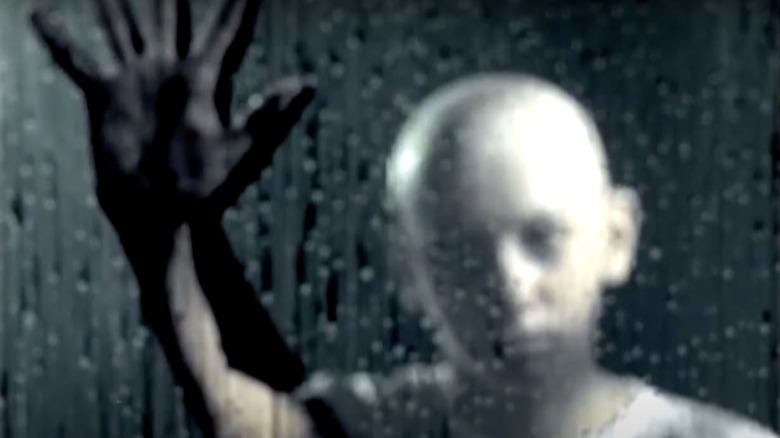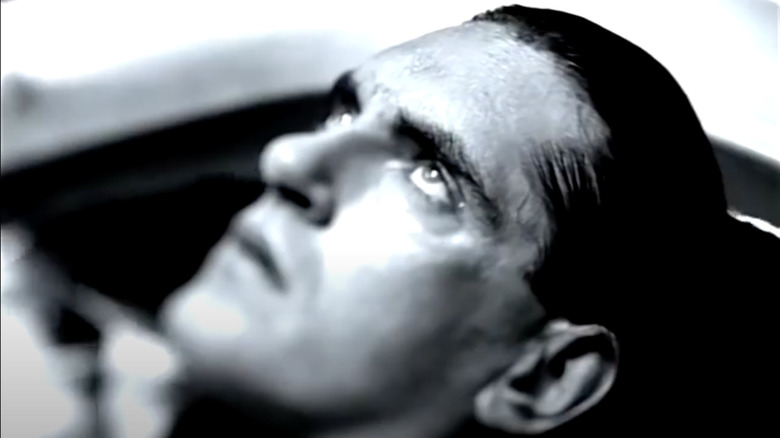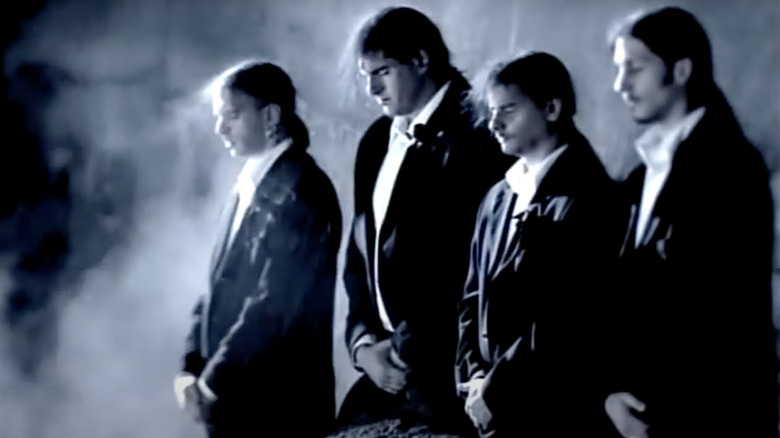The Tragic Real-Life Story Of Type O Negative
Correction 09/06/22: A previous version of this article stated that Peter Steele was arrested for indecent exposure, and that Josh Silver is the band's guitarist. Steele was not arrested for indecent exposure, and Silver is the band's keyboardist not guitarist.
Type O Negative was never destined to be another forgettable metal band. Then again, Peter Steele never thought he would earn a throne in the pantheon of rock.
Crawling out of the wreckage of Brooklyn-born Steele's former hardcore bands Fallout and Carnivore in the early '90s, with Steele on vocals and bass, guitarist Kenny Hickey, keyboardist Josh Silver, and drummer Sal Abruscato (later replaced by Johnny Kelly), Type O would soon unearth a mashup of goth, hardcore, and doom metal unlike anything else that had been heard at the time. From the erotic flames of "Be My Druidess" to the dread of "Everyone I Love is Dead," or the desperation of "Anesthesia," the voice of Steele is one that will forever echo in the shadowy chambers of your brain. He sounded as menacing as he appeared and could have easily emerged from one of Anne Rice's vampire novels.
Type O's style was not dark just for the sake of being dark. With wrenching riffs and lyrics that bled heartbreak one moment, and vengeance the next, their music was an expression of some almost unreal real-life experiences. The Drab Four were haunted by trauma, addiction, arrests, allegations of attempted murder, medical emergencies, mental illness, and finally Steele's unexpected death — when they were on the verge of recording an album that would never come into being. These are the tragic real-life stories of the genre-bending band Type O Negative, which continues to endure.
This article contains references to drug and alcohol misuse.
The band almost didn't exist
Type O Negative frontman Peter Steele worked for the Brooklyn Parks Department while the band was in its early days. Some might think he'd have happily ditched that job for the prospect of living like a rock star, but he was reluctant to leave — Steele originally had little desire for fame. According to a 1997 interview with Circus (via Blabbermouth), he lived for being the guy who would do everything, from hauling massive amounts of trash down the highway, to cleaning up bodily fluids.
"Peter didn't want to give up his day job and we had many fights," former Type O drummer Sal Abruscato told Metalgeek (via Blabbermouth). His former boss also recalled that, even after he rose to be the vampire king of metal, Steele would still swing by the Parks Department and make cracks about coming back if the band thing didn't work out. In fact, one of their iconic hits — "Black No. 1" — was the brainchild of Steele's random thoughts as he drove a garbage truck. "I was waiting in line for three hours to dump 40 cubic yards of human waste at the Hamilton Avenue Marine Transfer Station, and I wrote the song in my head," he told Revolver (via Loudwire) about the tune's genesis, in a 2008 interview. "I'm not kidding you."
Type O Negative's sound and lyrics were fueled by heartbreak.
Underneath his imposing 6-foot-8 frame and Nosferatu-esque image, Peter Steele was what The Aquarian called a "diehard romantic," and in that same interview he admitted to them that he had "always been very sensitive," which "contrasted greatly with my physical appearance." He had no girlfriends in high school, and couldn't even stand his own reflection. When As Long as It's Black asked Steele why his lyrics can sometimes sound cruel, he confessed one woman's betrayal had scarred him so badly that he attempted suicide.
Louder describes how most Type O Negative songs are reminiscent of one type of heartbreak or another, starting with their first album, 1991's "Slow, Deep and Hard" — an audible version of a heartbreak diary. This debut album contains the revenge anthem "Unsuccessfully Coping with the Natural Beauty of Infidelity," written by Steele the night after an especially wrenching breakup, according to Vice. So why did Steele torture himself by playing songs that reminded him of heartbreak like this, over and over? Somehow, he got off on it. As he told As Long as It's Black, "I am a masochist, I suppose."
If you or anyone you know is having suicidal thoughts, please call the National Suicide Prevention Lifeline at 1-800-273-TALK (8255).
Steele channeled his grief .. and cats
"Slow, Deep and Hard" comes in roaring for vengeance, but even after the band had moved on to the sanguine melodies that would come to dominate "Bloody Kisses (a Death in the Family)," and subsequent albums, the lyrics remained steeped in Peter Steele's personal life. He confided in Louder that he had a tendency to keep his problems buried internally, until they finally erupted from the depths. Though he had "issues with love and issues with loss," as he told them in that same interview, the untimely death of his mother "was probably the worst thing that ever happened to me." This was what inspired most of Type O's final album "Dead Again," such as the mournful dirge "September Sun" and supercharged "Halloween in Heaven."
Revolver argues that Steele's own misery was amplified in his songwriting, such as "Black No. 1 (Little Miss Scare-All)," which isn't just about any goth girl, though the lyrics sound as if they could be. What the song doesn't mention is that this was the girlfriend who drove him to attempt suicide, according to Pitchfork. On a lighter note, "Bloody Kisses" only sounds as if it's memorializing a person: Revolver reveals it was actually an ode to one of Steele's cats — who knew the reigning king of goth metal was also a cat lover?
If you or anyone you know is having suicidal thoughts, please call the National Suicide Prevention Lifeline at 1-800-273-TALK (8255).
Type O Negative were inspired by a resurgent vampire genre
It was by pure chance that Type O's vampire aesthetic coincided with the release of the film adaptation of "Interview With the Vampire" in 1994, a year after the band had released their third album, "Bloody Kisses." Around that time, Sal Abruscato told Metal Hammer Magazine that "the whole vampire allure connected with people," and that the movie didn't exactly hurt, either, because "the band soon started attracting a lot of female fans because of it."
The horror genre became a significant influence for Peter Steele, showing through his lyrics and artistic expression. The music video for "Suspended in Dusk" is actually remastered footage from the 1929 vampire movie "Nosferatu," with the creepy count Orlok stalking humans, upon whom he must feed. In this song, Steele tells a story of what he calls "damned immortality" in husky whispers, of an immortal who can only watch his human objects of lust fade into death, as he himself lives on. Other examples include "Wolf Moon," where he howls about thirsting for human blood after dark, and vampire-themed tracks such as "Love You to Death," and "Die With Me."
Steele became addicted to drugs and alcohol
Peter Steele was a heavy drinker who became addicted to cocaine, in an attempt to numb the still-throbbing scars of past trauma. "I tried to mask the pain by drowning myself in cocaine and alcohol until I thought I was the pope," he told Louder. It even drove him to paranoia, wearing night vision goggles in the dark to make sure no one was after him, until he overdosed and landed in a psychiatric institution.
As the singer admitted to MK Magazine, he was constantly on law enforcement's radar because of drug misuse, was reluctant to drag himself to parole appointments, and had to be hauled away to jail after a series of interventions. In an interview with GetMetal.com (via Blabbermouth), he called alcohol a "liquid drug," and that he lost himself in cocaine binges. He also admitted to Louder that he got into cocaine at 35, perhaps surprisingly late for someone who had been on the metal scene for as long as he had, but this was Peter Steele, and just about everything he did was unexpected.
Steele's gallows humor never subsided: During one stint in rehab, when he was asked by doctors what drugs he was using, Vinyl Lair remembers his answer being "cocaine, alcohol, and redheads." That last one left the staff briefly scratching their heads.
Peter Steele also had a criminal record
Peter Steele was no stranger to handcuffs, and had a rap sheet to match his rock star status. Aside from narcotics, there were other shenanigans that had him repeatedly butting heads with the law. A parole violation landed him behind bars at New York's infamous Rikers Island for attempted murder, after trying to kill an ex-girlfriend's partner while high on drugs, according to GNR Central. The Type O frontman fell even deeper into his own personal hell while locked up, though eventually the charges were reduced to assault. There, as he told MK Magazine, it wasn't the jeers of "undertaker" and "Tarzan" that got under his skin the most, or even hardened inmates looking for their next punching bag: What really haunted him was the thought of not coming home in time to see his mother alive.
Drugs almost ruined the band
During the making of "World Coming Down," Type O's drummer Johnny Kelly admitted that he feared the singer had plunged too deep into his vices. "Peter wasn't in top form — drugs had started to get in the way of things," he told Louder. It came to the point that Peter Steele had no desire to perform, because the drug-fueled lyrics only reminded him of his spiraling state. As Kelly told Billboard in another interview, the singer's desire to live became questionable. "You get to that perspective of 'Is he going to make it?' that you can't plan anything a year from now," he said. Guitarist Kenny Hickey told Kerrang! that the song "I Don't Wanna Be Me" was an outpouring of Steele's frustration over his addictions and the adverse effects on his health.
Steele's arrests (most of which would have never happened without his drug and alcohol misuse), and the time he did in both jail and rehab, were not easy on the band. Hickey also told Kerrang! that he thought Steele had tired of touring. Steele eventually became mostly clean, but sometimes, as he told MK Magazine, when his addiction called, he would answer. He also remembered himself as being almost completely incoherent when he was under the influence, and suspected irreversible brain damage after years of addiction.
Steele never stopped hating himself
Peter Steele's self-hatred was burning inside his massive chest years before Type O Negative even existed. He told The Aquarian that he was an abnormally tall kid, teased for his size, and he felt helpless when bullies hounded him. "I was big, but I didn't know how to fight back," he said. The singer would go on to experience a massive growth spurt in high school — but it still didn't make him popular with the girls. It was only after "Bloody Kisses" was released that female groupies swarmed the stage, and Steele didn't mind the attention, as he admitted to Jerry Springer in a live appearance.
Kenny Hickey later said in a Kerrang! interview, discussing the origins of "I Don't Wanna Be Me," that Steele "wasn't really doing too well, health-wise." Hickey also told Kerrang! that "He was getting sick of addictions and sick of life ... He didn't wanna be Pete anymore." The metal giant who never wanted to turn into a rock star was also growing weary of being one. He was bombarded with pressures and publicity, not to mention that he was still touring as his health was on the decline, and it got to the point that he almost ditched band life. Louder notes that Type O had to cancel their 2004 tour because of Steele's health issues, though he seemed to reanimate in 2005, not knowing he had less than five years left to live.
If you or someone you know is struggling with mental health, please contact the Crisis Text Line by texting HOME to 741741, call the National Alliance on Mental Illness helpline at 1-800-950-NAMI (6264), or visit the National Institute of Mental Health website.
Type O Negative nearly ditched the label that made them famous
Soon after the genesis of Type O Negative, Peter Steele wanted to part ways with Roadrunner Records. They had put out two albums from his previous band, Carnivore, but according to Louder, they hadn't handled them the way he wanted, and the label wasn't well known. However, despite Steele being anxious to leave, his contract with them said otherwise. It was Roadrunner talent scout Monte Conner who finally convinced him to stay, after listening to Type O's first post-Carnivore demo. "We were so excited by the demos that we actually said to the band ... [that] we were ready to roll up our sleeves and invest in the band to make a masterpiece," Conner told Revolver.
While Conner was ready to snag the most impressive producer he could find, Steele and the rest of the band balked at the thought — they wanted production in their own hands. The irony is that the producers who did give the demo a listen, thought the band had pretty much nailed it on the first play. Type O did end up taking the production reigns, though the Roadrunner contract they almost rejected ran down after 1999's "World Coming Down." As Josh Silver told radio station KNAC, it was "the last record on Roadrunner, unless we 're-up' with them for some last-minute reason that I am currently not aware of."
The band's lyrics attracted much criticism
Type O was blasted with accusations for many of their lyrics — racism, sexism, fascism, and even anti-semitism. They were sometimes branded as neo-Nazis, in spite of the fact that keyboardist Josh Silver is Jewish. A 1997 article in Penn State University's newspaper, The Collegian, called attention to an anti-racist group being incensed by Type O Negative Songs like "Der Untermensch," who tried, but ultimately failed, to cancel a show. The song's title, which translates as "The Subhuman" in German, was, according to Kenyon University, associated with the worst aspects of Nazi philosophy. It didn't help that the lyrics slammed welfare and people who would rather not pay taxes. Some thought that track also seemed to imply most of those people were immigrants.
Type O didn't want to be associated with anything remotely related to Nazi ideology and World War II. Kenny Hickey cleared up the meaning of the song, which was written by Peter Steele, when he told The Collegian that it had nothing to do with immigrants, and was really "about people who are young and healthy and can work ... people who take advantage." Steele himself grew up in an immigrant family, as then-executive vice president of Roadrunner Records Doug Keogh told Blabbermouth. Peter Steele biographer Jeff Wagner told Vice that the infamously opinionated singer "loved to play devil's advocate," and spark drama by making his views public. However, he assured people he was actually neither racist, nor sexist.
Peter Steele's sudden death might have not been preventable
From childhood, Peter Steele had been aware of his irregular heartbeat, caused by atrial fibrillation, according to Loudwire, and his bandmates were aware of this. It didn't bode well for him that several male relatives had died of heart issues before 50, and neither did the massive amounts of drugs he was doing while on medication for the condition, which by itself is not necessarily fatal. Steele was prone to obsessions that fueled so much binging. "Women, food, alcohol, he had to have mass quantities," Kenny Hickey told radio station KBAT. "He dreaded running out of anything. He's the only guy I know who could do two eight balls and eat $60 of Chinese food."
The cause of Steele's death was initially thought to have been an aortic aneurism, as Type O manager Mike Renault told CBS News (via Rolling Stone). An autopsy later discovered that a bout of diverticulitis eventually led to his demise, as reported by Loaded Radio. Hickey also told KBAT that Steele neglected his health even after being hospitalized. Despite facing the aforementioned health scare which shook the band in 2004, he was thought to be improving soon after. As Josh Silver, Hickey, and Johnny Kelly said on the band's now-defunct website (via MTV), "Peter had been enjoying a long period of sobriety and improved health and was imminently due to begin writing and recording new music for our follow-up to 'Dead Again.'"
Without Steele, there was no Type O Negative
While the band went through its dramas like any other, they broke up forever when their frontman died. No fights triggered it — there was just nobody else who could even walk in Peter Steele's combat boots, let alone replace him. Steele's hulking figure left a void just as massive as he was.
Drummer Johnny Kelly told Billboard that "in a lot of ways, it feels like he never left." His bandmates hadn't expected it. While they knew Steele had been through the wringer with his health, they planned to start recording soon and were unprepared for the shock when, as Loudwire reports, a call from his sister turned everything upside down. It was as if he had suddenly vanished. The band's final show before they lost Steele was during Halloween in 2009 — fitting for a man who wrote lyrics like "every day is Halloween."
Kelly and Kenny Hickey would go on to play in Silvertomb, while Josh Silver left the metal scene entirely, and became a paramedic. Hickey is now the vocalist and guitarist for Silvertomb, but Type O will always be in his blood, and so will Steele. As he said on their site (via MTV), "Part of me died with him."
